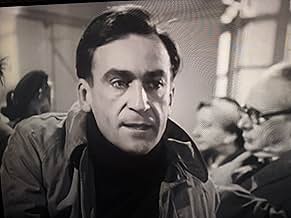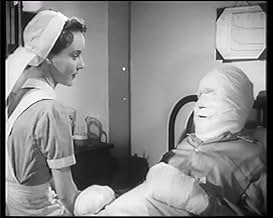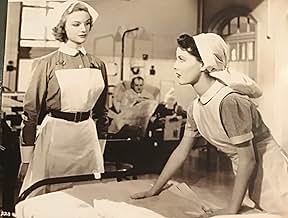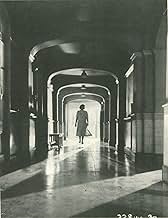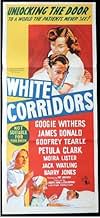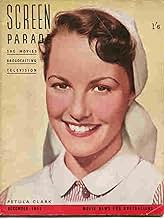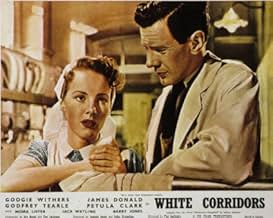Ajouter une intrigue dans votre langueHospital drama set at the Yeoman's Hospital, in the English Midlands, during the early 1950s.Hospital drama set at the Yeoman's Hospital, in the English Midlands, during the early 1950s.Hospital drama set at the Yeoman's Hospital, in the English Midlands, during the early 1950s.
- Réalisation
- Scénario
- Casting principal
- Nomination aux 2 BAFTA Awards
- 3 nominations au total
Avis à la une
As a Petula Clark fan I was interested to see this movie,and having watched it a few times now even if Petula wasn't in it,I would say it is an excellent British movie of its era ,and paved the way for British hospital TV dramas such as Emergency Ward Ten in the 60's through to "Casualty" in the 21st century. The acting by the whole cast is superb ,and I would love to see this movie on DVD and hope that one day it will get the recognition it deserves. Googie Withers is a very under-rated actress and plays her part to perfection,and great to see many good performances from James Donald,Moira Lister,and Jean Anderson. This film rarely gets shown on TV so write in to your TV stations to get it shown!
Like many movies with a hospital setting, this one has as many subplots as there are patients and staff.
There's the new nurse (Petula Clark), frightened by her first sight of blood, and intimidated by the head nurse. There's a brilliant young surgeon with a reputation as a playboy, who also happens to be the son of the hospital's chief surgeon. There are Drs. Neil Marriner and Sophie Dean, struggling to keep their marriage intact as their medical careers pull them in different directions. There's a sweet young lad admitted for an infected hand who might require an untried and highly risky treatment. There's a burn victim (Bernard Lee of James Bond `M' fame), his head completely wrapped in bandages, who dreads how he might appear once the bandages are removed.
Admittedly these are ingredients of a daytime soap opera. But in the hands of the Rank Organization, they make for a well-crafted collection of absorbing human-interest stories.
There are a few dated plot elements as well as some surprisingly contemporary ones. During a tour of a research laboratory, a member of the hospital board declares `So that's a Geiger counter, I've heard of them.' A senior nurse is passed over for a promotion due to her romantic entanglements with a doctor. By contrast, Dr. Sophie Dean seems like a 21st Century woman. She is well-respected by all for her competence, outperforms several of her male peers, and is a beautiful and loving wife. She and her doctor husband have thoughtful discussions about whether they'll need to sacrifice their marriage or her career aspirations.
I have only one complaint of any significance. Multiple `cliffhanger' subplots were resolved abruptly in the last few minutes. Other than that, this movie compares favorably with better known British films of the time.
I reviewed this movie as part of a project at the Library of Congress. I've named the project FIFTY: 50 Notable Films Forgotten Within 50 Years. As best I can determine, this film, like the other forty-nine I've identified, has not been on video, telecast, or distributed in the U.S. since its original release. In my opinion, it is worthy of being made available again.
There's the new nurse (Petula Clark), frightened by her first sight of blood, and intimidated by the head nurse. There's a brilliant young surgeon with a reputation as a playboy, who also happens to be the son of the hospital's chief surgeon. There are Drs. Neil Marriner and Sophie Dean, struggling to keep their marriage intact as their medical careers pull them in different directions. There's a sweet young lad admitted for an infected hand who might require an untried and highly risky treatment. There's a burn victim (Bernard Lee of James Bond `M' fame), his head completely wrapped in bandages, who dreads how he might appear once the bandages are removed.
Admittedly these are ingredients of a daytime soap opera. But in the hands of the Rank Organization, they make for a well-crafted collection of absorbing human-interest stories.
There are a few dated plot elements as well as some surprisingly contemporary ones. During a tour of a research laboratory, a member of the hospital board declares `So that's a Geiger counter, I've heard of them.' A senior nurse is passed over for a promotion due to her romantic entanglements with a doctor. By contrast, Dr. Sophie Dean seems like a 21st Century woman. She is well-respected by all for her competence, outperforms several of her male peers, and is a beautiful and loving wife. She and her doctor husband have thoughtful discussions about whether they'll need to sacrifice their marriage or her career aspirations.
I have only one complaint of any significance. Multiple `cliffhanger' subplots were resolved abruptly in the last few minutes. Other than that, this movie compares favorably with better known British films of the time.
I reviewed this movie as part of a project at the Library of Congress. I've named the project FIFTY: 50 Notable Films Forgotten Within 50 Years. As best I can determine, this film, like the other forty-nine I've identified, has not been on video, telecast, or distributed in the U.S. since its original release. In my opinion, it is worthy of being made available again.
WHITE CORRIDORS is an early example of the kind of medical drama that would become a staple of Western television in the late 1950s, and continues thus today. All of the various ingredients are already present here, from the nerve-wracking scenes of surgery to the human drama involving the doctors, nurses and other staff members involved in the running of the hospital. Petula Clark stars as a novice nurse, Googie Withers brings charisma as her senior, and James Donald is a conflicted doctor. Some stand-out characters include Basil Radford's exasperated patient and Bernard Lee's burn victim. Watched today, one wonders how much has really changed in the 70 plus years since this film's release.
James Donald is "Dr. Marriner", a trailblazing surgeon in 1950s England, who is working on a method of treating infections that resist penicillin. He is optimistic that he can develop something in time to save the life of a young boy who is fighting septicaemia. Meantime, aspiring surgeon "Sophie" (Googie Withers) is facing a dilemma of her own. She is in love with the doctor, but has the opportunity to relocate to a London hospital where her career can blossom more fully. Things come to an head when "Marriner" becomes accidentally infected, too - and she has to make a tough decision that could, quite literally, kill or cure. It's maybe a bit too long, this, but for the most part is glides along well with some strong leading characterisations to support this more substantial plot. The supporting cast of British household names - Godfrey Searle, Petula Clark and Moira Lister add flesh to the bones, and there are a couple of sub-plots to let us come up for air every now and again from the main, quite thought provoking, narrative. Perhaps the ending is a little too predictable, but still - it's worth a watch.
10clanciai
This hospital insight is more thrilling and captivating than almost any thriller. It is documentary in character and as far as you can get from a soap opera, although it is thronged with stuff to make cheap TV entertainments, but the stuff here is handled professionally. There are goofs, but those responsible have to stand for them and take the consequences of a demission, because perfection and discipline has to be absolute, if nothing is to go wrong. When something goes wrong here it is nobody's fault, the one casualty is due to no one's fault, while more serious faults could have had even worse consequences. At the same time it is a very modern drama dealing with the problem of penicillin resistance, and doctor Marriner is waging his life on the research into some possible remedy of this problem. Doctor Sophie Dean has the longest and most sleepless night in her life as a consequence, while both she and the young green nurse Petula Clark manage to cope with the arduous stress of fighting death. It is a most impressive film educating the audience by offering a keen and intimate insight into the daily drama of any hospital.
Le saviez-vous
- AnecdotesThe last film of Basil Radford.
- Citations
Retired Civil Servant: Now, suppose I was dying what would you do?
Tranter: Ah - you'd be a casualty, an emergency, different category altogether you see sir. You'd get immediate treatment.
Retired Civil Servant: I'm very glad to hear it!
Meilleurs choix
Connectez-vous pour évaluer et suivre la liste de favoris afin de recevoir des recommandations personnalisées
Détails
- Durée1 heure 42 minutes
- Couleur
- Rapport de forme
- 1.37 : 1
Contribuer à cette page
Suggérer une modification ou ajouter du contenu manquant

Lacune principale
By what name was White Corridors (1951) officially released in India in English?
Répondre
